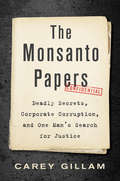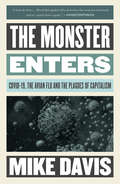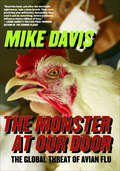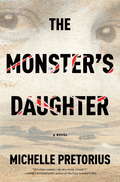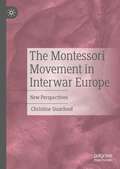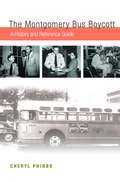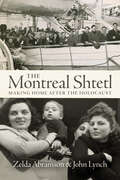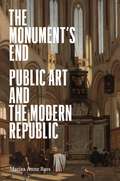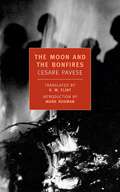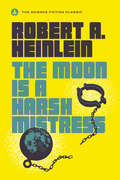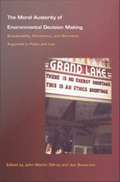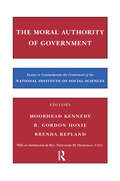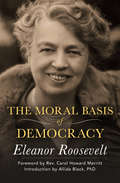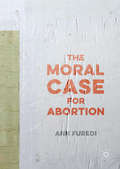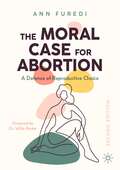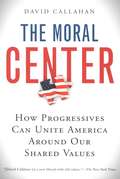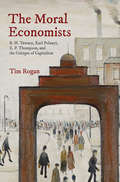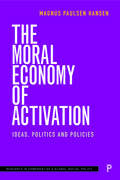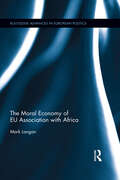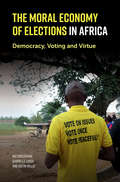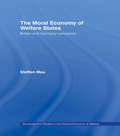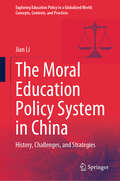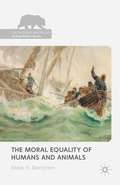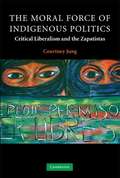- Table View
- List View
The Monsanto Papers: Deadly Secrets, Corporate Corruption, and One Man's Search for Justice
by Carey GillamLee Johnson was a man with simple dreams. All he wanted was a steady job and a nice home for his wife and children, something better than the hard life he knew growing up. He never imagined that he would become the face of a David-and-Goliath showdown against one of the world's most powerful corporate giants. But a workplace accident left Lee doused in a toxic chemical and facing a deadly cancer that turned his life upside down. In 2018, the world watched as Lee was thrust to the forefront of one the most dramatic legal battles in recent history. The Monsanto Papers is the inside story of Lee Johnson's landmark lawsuit against Monsanto. For Lee, the case was a race against the clock, with doctors predicting he wouldn't survive long enough to take the witness stand. For the eclectic band of young, ambitious lawyers representing him, it was a matter of professional pride and personal risk, with millions of dollars and hard-earned reputations on the line. For the public at large, the lawsuit presented a question of corporate accountability. With enough money and influence, could a company endanger its customers, hide evidence, manipulate regulators, and get away with it all—for decades? Readers will be astounded by the depth of corruption uncovered, captivated by the shocking twists, and moved by Lee's quiet determination to see justice served. With gripping narrative force that reads like fiction, The Monsanto Papers takes readers behind the scenes of a grueling legal battle, pulling back the curtain on the frailties of the American court system and the lengths to which lawyers will go to fight corporate wrongdoing.
The Monster Enters: COVID-19, Avian Flu, and the Plagues of Capitalism
by Mike DavisA new edition of a classic book on viral catastrophes--the Spanish flu, the Avian flu, and now, Covid-19In his book, The Monster at Our Door, the renowned activist and author Mike Davis warned of a coming global threat of viral catastrophes. Now in this expanded edition of that 2005 book, Davis explains how the problems he warned of remain, and he sets the COVID-19 pandemic in the context of previous disastrous outbreaks, notably the 1918 influenza disaster that killed at least forty million people in three months and the Avian flu of a decade and a half ago.In language both accessible and authoritative, The Monster Enters surveys the scientific and political roots of today&’s viral apocalypse. In doing so it exposes the key roles of agribusiness and the fast-food industries, abetted by corrupt governments and a capitalist global system careening out of control, in creating the ecological pre-conditions for a plague that has brought much of human existence to a juddering halt.
The Monster at Our Door: The Global Threat of Avian Flu
by Mike DavisThe MacArthur Fellow and author of Dead Cities presents a terrifying forecast of a new global threat—and &“its argument is irrefutable&” (The Independent). Hailed by The Nation as a &“master of disaster prose,&” author and activist Mike Davis addresses the imminent catastrophe of Avian influenza. In 1918, a pandemic strain of influenza killed at least forty million people in three months. Now, leading researchers believe, another global outbreak is all but inevitable. A virus of astonishing lethality, known as H5N1, has become entrenched in the poultry and wild bird populations of East Asia. It kills two out of every three people it infects. The World Health Organization warns that it is on the verge of mutating into a super-contagious pandemic form that could visit several billion homes within two years. In this urgent and alarming book, Mike Davis reconstructs the scientific and political history of a viral apocalypse in the making, exposing the central roles of agribusiness and the fast-food industries, abetted by corrupt governments, in creating the ecological conditions for the emergence of this new plague.
The Monster's Daughter
by Michelle PretoriusSomewhere on the South African veld, 1901: At the height of the Boer War, a doctor at a British concentration camp conducts a series of grim experiments on Boer prisoners. His work ends in chaos, but two children survive: a boy named Benjamin, and a girl named Tessa ... One hundred years later, a disgraced young police constable is reassigned to the sleepy South African town of Unie, where she makes a terrifying discovery: the body of a woman, burned beyond recognition. The crime soon leads her into her country's violent past--a past that includes her father, a high-ranking police official under the apartheid regime, and the children left behind in that long ago concentration camp. Michelle Pretorius's epic debut weaves present and past together into a hugely suspenseful, masterfully plotted thriller that calls to mind Lauren Beukes's The Shining Girls and Tana French's The Secret Place. With an explosive conclusion, it marks the emergence of a thrilling new writer.From the Hardcover edition.
The Montessori Movement in Interwar Europe: New Perspectives
by Christine QuarfoodThis book explores how the Montessori movement developed a cultural critique and gained momentum during the interwar years of political turbulence. Drawing on archival sources, press material and Montessori's literary output, the book provides a multifaceted analysis of this significant educational movement. The first two chapters presents the scientific background, how Montessori's innovative method offered new solutions to age-old problems of teacher-pupil interaction. The following chapters focus on the social and psycho-pedagogical aspects of Montessorism, and how the movement's culture-critical message about the child's liberation was received and reinterpreted in the wider European public debate. The last four chapters shed new light on the politicisation of Italian Montessorism during the problematic Montessori-Mussolini alliance, 1924-1934.
The Montgomery Bus Boycott: A History And Reference Guide
by Cheryl PhibbsThe Montgomery Bus Boycott: A History and Reference Guide offers a comprehensive account of a critical turning point in American history. The 1955–1956 bus boycott in Montgomery, Alabama, catapulted Martin Luther King, Jr., into the national spotlight and made Rosa Parks a household name. Far from the beginning of the Civil Rights Movement, it was the culmination of years of struggle, and a triumph of one Southern black community's determined non-violent protest against discrimination.
The Montreal Shtetl: Making Home After the Holocaust
by John Lynch Zelda AbramsonAs the Holocaust is memorialized worldwide through education programs and commemoration days, the common perception is that after survivors arrived and settled in their new homes they continued on a successful journey from rags to riches. While this story is comforting, a closer look at the experience of Holocaust survivors in North America shows it to be untrue. The arrival of tens of thousands of Jewish refugees was palpable in the streets of Montreal and their impact on the existing Jewish community is well-recognized. But what do we really know about how survivors’ experienced their new community? Drawing on more than 60 interviews with survivors, hundreds of case files from Jewish Immigrant Aid Services, and other archival documents, The Montreal Shtetl presents a portrait of the daily struggles of Holocaust survivors who settled in Montreal, where they encountered difficulties with work, language, culture, health care, and a Jewish community that was not always welcoming to survivors. By reflecting on how institutional supports, gender, and community relationships shaped the survivors’ settlement experiences, Abramson and Lynch show the relevance of these stories to current state policies on refugee immigration.
The Monument’s End: Public Art and the Modern Republic
by Marisa Anne BassHow today&’s questions surrounding monuments and the ways we commemorate our past first arose in Rembrandt&’s timeMonuments occupy a controversial place in nations founded on principles of freedom and self-governance. It is no accident that when we think of monuments, we think of statues modeled on legacies of conquest, domination, and violence. The Monument&’s End reveals how the artists, architects, poets, and scholars of the early modern Netherlands contended with the profound disconnect between the public monument and the ideals of republican government. Their experiences offer vital lessons about the making, reception, and destruction of monuments in the present.In the seventeenth century, the newly formed Dutch Republic dominated world trade and colonized vast overseas territories even as it sought to shed the trappings of its imperial past. Marisa Anne Bass describes the frustrated attempts by figures such as Rembrandt van Rijn and playwright and poet Joost van den Vondel to reimagine public memory for their emergent nation. She shows how the most celebrated age of Dutch art was more an age of bronze than of gold, one in which the pursuit of freedom from domination was constantly challenged by the commercial ambitions of empire.Exploring how the artists and intellectuals of this vibrant century asked questions that still resonate today, this beautifully illustrated book discusses works by contemporary artists such as Spencer Finch and Thomas Hirschhorn and offers new perspectives on monuments like the 9/11 Memorial and Museum and events such as the Unite the Right rally in Charlottesville.
The Moon And The Bonfires
by Cesare Pavese Mark Rudman R. W. FlintWinner of the 2003 PEN/Book-of-the-Month Club Translation Prize <p><p> A NEW YORK REVIEW BOOKS ORIGINAL <p> The nameless narrator of The Moon and the Bonfires, Cesare Pavese's last and greatest novel, returns to Italy from California after the Second World War. He has done well in America, but success hasn't taken the edge off his memories of childhood, when he was an orphan living at the mercy of a bitterly poor farmer. He wants to learn what happened in his native village over the long, terrible years of Fascism; perhaps, he even thinks, he will settle down. And yet as he uncovers a secret and savage history from the war--a tale of betrayal and reprisal, sex and death--he finds that the past still haunts the present. The Moon and the Bonfires is a novel of intense lyricism and tragic import, a masterpiece of twentieth-century literature that has been unavailable to American readers for close to fifty years. Here it appears in a vigorous new English version by R. W. Flint, whose earlier translations of Pavese's fiction were acclaimed by Leslie Fiedler as "absolutely lucid and completely incantatory. "
The Moon Is a Harsh Mistress (S. F. Masterworks Ser. #No. 7)
by Robert A. HeinleinFor fans of Artemis--The visionary tour de force from "one of the grand masters of science fiction" (The Wall Street Journal).Widely acknowledged as one of Robert A. Heinlein's greatest works, The Moon Is a Harsh Mistress rose from the golden age of science fiction to become an undisputed classic--and a touchstone for the philosophy of personal responsibility and political freedom. A revolution on a lunar penal colony--aided by a self-aware supercomputer--provides the framework for a story of a diverse group of men and women grappling with the ever-changing definitions of humanity, technology, and free will--themes that resonate just as strongly today as they did when the novel was first published. The Moon Is a Harsh Mistress gives readers an extraordinary, thought-provoking glimpse into the mind of Robert A. Heinlein, who, even now, "shows us where the future is" (Tom Clancy).
The Moonlight Mystery: The Moonlight Mystery (The Rescue Princesses #3)
by Paula HarrisonThese are no ordinary princesses . . . they're Rescue Princesses!Princesses to the rescue! Another animal is in trouble and the Rescue Princesses must save the day.Princess Lulu loves visiting the lion cubs that roam the plains of her kingdom. But when all of the lion cubs disappear, Lulu must spring into action. She and the other princesses have to discover what happened to the missing lions -- and fast!
The Moral Austerity of Environmental Decision Making: Sustainability, Democracy, and Normative Argument in Policy and Law
by John Martin Gillroy Joe BowersoxIn The Moral Austerity of Environmental Decision Making a group of prominent environmental ethicists, policy analysts, political theorists, and legal experts challenges the dominating influence of market principles and assumptions on the formulation of environmental policy. Emphasizing the concept of sustainability and the centrality of moral deliberation to democracy, they examine the possibilities for a wider variety of moral principles to play an active role in defining "good" environmental decisions. If environmental policy is to be responsible to humanity and to nature in the twenty-first century, they argue, it is imperative that the discourse acknowledge and integrate additional normative assumptions and principles other than those endorsed by the market paradigm. The contributors search for these assumptions and principles in short arguments and debates over the role of science, social justice, instrumental value, and intrinsic value in contemporary environmental policy. In their discussion of moral alternatives to enrich environmental decision making and in their search for a less austere and more robust role for normative discourse in practical policy making, they analyze a series of original case studies that deal with environmental sustainability and natural resources policy including pollution, land use, environmental law, globalism, and public lands. The unique structure of the book--which features the core contributors responding in a discourse format to the central chapters' essays and debates--helps to highlight the role personal and public values play in democratic decision making generally and in the field of environmental politics specifically. Contributors. Joe Bowersox, David Brower, Susan Buck, Celia Campbell-Mohn, John Martin Gillroy, Joel Kassiola, Jan Laitos, William Lowry, Bryan Norton, Robert Paehlke, Barry G. Rabe, Mark Sagoff, Anna K. Schwab, Bob Pepperman Taylor, Jonathan Wiener
The Moral Authority of Government
by Henry Barbera R. HoxieThese new essays prepared to commemorate the centennial of the National Institute of Social Sciences have been carefully crafted to deal with an overriding concern of our time--those elements in political rule that go beyond legal rights and responsibilities into the moral requirements of effective governance. The principal theme of this book is presidential leadership. The presidency personifies government authority, including moral authority.In the first part of this book most of the essays argue that the moral authority of leaders depends on high personal standards as well as policy outcomes. The second segment on the rule of law and character raises considerations not limited to the presidency. Character and the authority that derives from it are demonstrated most effectively not by what someone does in his or her personal life, but in the moral values of the causes espoused and effectiveness in pursuing them. In the realm of international affairs, governmental leadership must wrestle with the moral and constitutional guidelines known as "reasons of state." Under what circumstances is it morally acceptable for a leader or government to practice deception upon the citizenry, to overthrow other governments, to bomb civilians?Many contributors raise the issue of what permits a government to take actions that would be immoral or illegal in individuals or groups. The final segment expands and deepens this theme by exploring the work and role of non-governmental agencies that influence both leaders and citizens in the public arena. In short, at a period that brings to a close a period in which the presidency has become more visible as well as more prominent, this collective effort sheds new light on classic themes. It will be an invaluable guide as we enter the new century.The contributors include an illustrious galaxy of public officials and political scientists, including Madeleine K. Albright, Judith A. Best, Betty Glad, C. Lowell Harriss, Travis Beal Jacobs, Ruth P. Morgan, Stanley A. Renshon, Donald L. Robinson and William vanden Heuvel.
The Moral Basis of Democracy
by Eleanor RooseveltA wartime manifesto on the moral obligations of democratic citizens from the most influential first lady in American history. With the threat of the Third Reich looming, Eleanor Roosevelt employs the history of human rights to establish the idea that at the core of democracy is a spiritual responsibility to other citizens. Roosevelt then calls on all Americans, especially the youth, to prioritize the well-being of others and have faith that their fellow citizens will protect them in return. She defines this trust between people as a trait of true democracy. Roosevelt advances an optimistic model for the democracy of the future, and although we&’ve taken some steps in the direction of her vision, it&’s still a long way from reality. The issues first addressed in this 1940 essay—namely financial inequality and racial discrimination—are sadly still relevant today, as bigotry continues to undermine our national unity. Her first publication as first lady, The Moral Basis of Democracy is an honest and heartfelt call for all Americans to choose love and faith over hatred and fear. Roosevelt takes an inspiring stance in defense of democracy, progress, and morality; the wisdom imparted here is timeless, and a must-read for every American. This edition features a foreword by Rev. Carol Howard Merritt, an introduction by Roosevelt historian Allida Black, PhD, and an illustrated biography of Eleanor Roosevelt including images from the author&’s estate.
The Moral Case for Abortion
by Ann FurediThis thought-provoking book sets out the ethical arguments for a woman’s right to choose. Drawing on the traditions of sociological thinking and moral philosophy, it maintains that there is a strong moral case for recognizing autonomy in personal decision-making about reproductive intentions. More than this, it argues that to prevent a woman from making her own choice to continue or end her pregnancy is to undermine the essence of her humanity. The author, a provider of abortion services in the UK, asserts that true respect for human life and true regard for individual conscience demand that we respect a woman’s right to decide, and that support for a woman’s right to a termination has moral foundations and ethical integrity. This fresh perspective on abortion will interest both pro- and anti-choice individuals and organizations, along with academics in the fields of gender studies, philosophy, ethics and religion.
The Moral Case for Abortion: A Defence of Reproductive Choice
by Ann FurediThis revised and updated edition of the 2016 bestselling work sets out the moral arguments for a woman’s right to decide the future of her pregnancy. Drawing on traditions of philosophical and sociological thinking, it presents the case for recognizing autonomy in personal, private decision-making about reproductive intentions. Further, it argues that to prevent a woman making this decision according to her own values is to undermine the essence of her humanity. The author explores how true respect for human life and regard for individual conscience demands that we support a woman’s right to decide, and that support for her right to terminate her pregnancy has moral foundations and ethical integrity. This second edition features a foreword by US abortion provider and reproductive justice advocate Dr. Willie Parker, as well as additional chapters that consider the rights of doctors and nurses to withdraw from abortion provision on grounds of conscience. Furedi also surveys the rapidly changing landscape of the abortion debate, including the rights of women in the aftermath of Trump's presidency; debates, politics and religion in Northern Ireland and the Republic of Ireland; and the differing levels of provision across Europe.
The Moral Center: How Progressives Can Unite America Around Our Shared Values
by David CallahanA &“new liberal with old values&” argues nothing is the matter with Kansas—and that the Democratic party needs to lead America out of its moral crisis (The New York Times). In this insightful book, the author of The Cheating Culture addresses the anxieties that many Americans share, pointing out that the problems most people care about are not hot-button partisan issues like abortion and gay marriage, but rather deeper subjects that neither party is addressing—the selfishness that is careening out of control, the effect of our violent and consumerist culture on children, and our lack of a greater purpose. As Republicans veer into zealotry, liberals can find common ground with the moderate majority. But to achieve electoral victories, they need a powerful new vision. In The Moral Center, David Callahan articulates that vision—and offers an escape from the dead-end culture war. With insights garnered from in-depth research and interviews, he examines some of our most polarized conflicts and presents unexpected solutions that lay out a new road map to the American center. &“Brilliant, challenging, practical and hopeful.&” —E. J. Dionne Jr., author of Why Americans Hate Politics &“Callahan shows why progressives often seem not to have such a [moral] center, ceding values to the Right, and why they need to get one to win the political battle.&” —Benjamin R. Barber, author of Consumed and Jihad vs. McWorld &“Callahan wants . . . to create a new public morality that is concerned about both poverty and video game violence, both wages and rap lyrics. He wants to soften the jagged edges of the culture wars.&” —Michael Tomasky, The New York Review of Books
The Moral Economists: R. H. Tawney, Karl Polanyi, E. P. Thompson, and the Critique of Capitalism
by Tim RoganA fresh look at how three important twentieth-century British thinkers viewed capitalism through a moral rather than material lensWhat’s wrong with capitalism? Answers to that question today focus on material inequality. Led by economists and conducted in utilitarian terms, the critique of capitalism in the twenty-first century is primarily concerned with disparities in income and wealth. It was not always so. The Moral Economists reconstructs another critical tradition, developed across the twentieth century in Britain, in which material deprivation was less important than moral or spiritual desolation.Tim Rogan focuses on three of the twentieth century’s most influential critics of capitalism—R. H. Tawney, Karl Polanyi, and E. P. Thompson. Making arguments about the relationships between economics and ethics in modernity, their works commanded wide readerships, shaped research agendas, and influenced public opinion. Rejecting the social philosophy of laissez-faire but fearing authoritarianism, these writers sought out forms of social solidarity closer than individualism admitted but freer than collectivism allowed. They discovered such solidarities while teaching economics, history, and literature to workers in the north of England and elsewhere. They wrote histories of capitalism to make these solidarities articulate. They used makeshift languages of “tradition” and “custom” to describe them until Thompson patented the idea of the “moral economy.” Their program began as a way of theorizing everything economics left out, but in challenging utilitarian orthodoxy in economics from the outside, they anticipated the work of later innovators inside economics.Examining the moral cornerstones of a twentieth-century critique of capitalism, The Moral Economists explains why this critique fell into disuse, and how it might be reformulated for the twenty-first century.
The Moral Economy of Activation: Ideas, Politics and Policies (Research in Comparative and Global Social Policy)
by Magnus HansenActivation policies which promote and enforce labour market participation continue to proliferate in Europe and constitute the reform blueprint from centre-left to centre-right, as well as for most international organizations. Through an in-depth study of four major reforms in Denmark and France, this book maps how co-existing ideas are mobilised to justify, criticise and reach activation compromises and how their morality sediments into the instruments governing the unemployed. By rethinking the role of ideas and morality in policy changes, this book illustrates how the moral economy of activation leads to a permanent behaviourist testing of the unemployed in public debate as well as in local jobcentres.
The Moral Economy of EU Association with Africa (Routledge Advances in European Politics)
by Mark LanganAfrica’s association with the European Union has long been hailed as a progressive model of North-South relations. European officials, in particular, have represented the Africa-EU ‘partnership’ as a pro-poor enterprise in which trade interests are married to development prerogatives. Applying a moral economy perspective, this book examines the tangible impact of Africa-Europe trade and development co-operation on citizens in developing countries. In so doing, it challenges liberal accounts of Europe’s normative power to enable benevolent change in the Global South and illuminates how EU discourse acts to legitimise unequal trade ties that have regressive consequences for ‘the poor’. Drawing upon the author’s own fieldwork, it assesses the difference between norms and the actual impact of EU concessions in relation to: budget support; aid for trade; private sector development (PSD); decent work. It concludes by considering the value of a moral economy approach in the assessment of free trade structures more widely. This text will be of key interest to scholars and students of Africanist IPE, European studies, and more broadly international political economy, international development, and international relations.
The Moral Economy of Elections in Africa: Democracy, Voting and Virtue
by Gabrielle Lynch Nic Cheeseman Justin WillisDo elections turn people into democratic citizens? Elections have long been seen as a way to foster democracy, development and security in Africa, with many hoping that the secret ballot would transform states. Adopting a new approach that focusses on the moral economy of elections, Nic Cheeseman, Gabrielle Lynch and Justin Willis show how elections are shaped by competing visions of what it means to be a good leader, bureaucrat or citizen. Using a mixed-methods study of elections in Ghana, Kenya and Uganda, they explore moral claims made by officials, politicians, civil society, international observers and voters themselves. This radical new lens reveals that elections are the site of intense moral contestation, which helps to explain why there is such vigourous participation in processes that often seem flawed. Demonstrating the impact of these debates on six decades of electoral practice, they explain why the behaviour of those involved so frequently transgresses national law and international norms, as well as the ways in which such transgressions are evaluated and critiqued – so that despite the purported significance of 'vote-buying', the candidates that spend the most do not always win.
The Moral Economy of Welfare States: Britain and Germany Compared (Routledge Studies in the Political Economy of the Welfare State #Vol. 5)
by Steffen MauThis book investigates why people are willing to support an institutional arrangement that realises large-scale redistribution of wealth between social groups of society. Steffen Mau introduces the concept of 'the moral economy' to show that acceptance of welfare exchanges rests on moral assumptions and ideas of social justice people adhere to. Analysing both the institution of welfare and the public attitudes towards such schemes, the book demonstrates that people are neither selfish nor altruistic; rather they tend to reason reciprocally.
The Moral Education Policy System in China: History, Challenges, and Strategies (Exploring Education Policy in a Globalized World: Concepts, Contexts, and Practices)
by Jian LiThis book examines the moral education policy system in China, discussing the challenges of promoting moral education policy in the country, and proposes relative strategies. It explores the moral education policy in China from various perspectives, including in preschool education, primary education, higher education, vocational type-based higher education, secondary vocational education, English education, music education, classroom teaching, citizenship education, and Chinese language education. This book serves as a guide for scholars and researchers who are interested, and work in, research on moral education policy in China, administrators, stakeholders in China's education system, and graduate students who major or minor in the field of moral education policy in China.
The Moral Equality of Humans and Animals (The Palgrave Macmillan Animal Ethics Series)
by Mark H BernsteinReceived opinion has it that humans are morally superior to non-human animals; human interests matter more than the like interests of animals and the value of human lives is alleged to be greater than the value of nonhuman animal lives. Since this belief causes mayhem and murder, its de-mythologizing requires urgent attention.
The Moral Force Of Indigenous Politics: Critical Liberalism And The Zapatistas
by Courtney JungTracing the political origins of the Mexican indigenous rights movement, from the colonial encounter to the Zapatista uprising, and from Chiapas to Geneva, Courtney Jung locates indigenous identity in the history of Mexican state formation. She argues that indigenous identity is not an accident of birth but a political achievement that offers a new voice to many of the world's poorest and most dispossessed. The moral force of indigenous claims rests not on the existence of cultural differences, or identity, but on the history of exclusion and selective inclusion that constitutes indigenous identity. As a result, the book shows that privatizing or protecting such groups is a mistake and develops a theory of critical liberalism that commits democratic government to active engagement with the claims of culture. This book will appeal to scholars and students of political theory, philosophy, sociology, and anthropology studying multiculturalism and the politics of culture.
